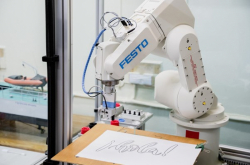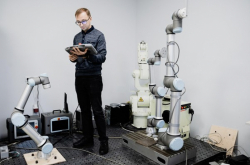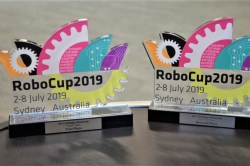Despite your focus on robotics, it is not the extent of your domain of interest. Which other fields does it include?
My work generally concerns control engineering: it’s a wider field which has many practical applications, robotics included. If we’re talking about developing software for robotic systems, you have to know the theory - the overall principles of controlling systems’ design that can be applied in such a practical field as robotics (for instance, in creating industrial robotic manipulators). I specialize in creating control algorithms first for abstract mathematical models, and then for particular practical tasks of controlling real technical systems.
 Industrial robots. Credit: roboticsbusinessreview.com
Industrial robots. Credit: roboticsbusinessreview.com
The methods and algorithms we develop as part of control engineering have a wide range of application. Apart from the aforementioned robotic manipulators, that can be different ships, aircraft, drones, driverless cars, telescopes and the like.
In my thesis, I focused on control and guidance of quadcopters and surface crafts; it was a complex study that summarized the results of three years’ worth of work dedicated to control algorithms of multidimensional objects.
Last month, your team’s project uHVAT won at GoTech. What’s so good about your invention? What problems does it solve?
At GoTech, we presented our multipurpose gripping unit which is a component for a cyberphysical system. Many gripping devices that are currently produced for the industry are customized for some specific operation or details of particular form, size and weight. For instance, if we produce water heating units, we use a gripping unit of a particular design.
 uHVAT project’s team at GoTech
uHVAT project’s team at GoTech
We offer a universal solution that will allow us to use a common device for any procedure. Its design will transform depending on the object it is working with. Standard industrial robots are fixed with a controller that is responsible for low-level operation of the device; our idea is to fix the gripping unit with a controller, too, so that it can send high-level commands to the main controller, such as to change its position so as to better grip the detail. This will allow to better transform and adapt the equipment to different production processes at minimal costs.
We got this idea from practice. It’s worth mentioning that the project began with my brother, Ivan Borisov. Three years ago he’d been working for a private company which manufactured industrial gripping devices. It was then when he understood that for every new process they have create a new device with limited functionality.
How do you plan to develop your project?
As of now, cyberphysical systems are actively developing, and us creating a new gripping device is just part of the process. Apart from me and Ivan, our colleague Vladislav Gromov whom I know since my university years is also working on our project.
After winning at GoTech, we understood that our idea is actually important and relevant. TRA Robotics have already expressed their interest in our invention, so we plan to collaborate with them.
 uHVAT prototype. Credit: Oleg Borisov’s personal archive
uHVAT prototype. Credit: Oleg Borisov’s personal archive
Has robotics been always part of your interests? When did you first understand what exactly you want to do in life?
I can’t say robotics has always been my life’s goal. After graduating from school, I outlined the range of subjects I was good at. Those were physics, mathematics and computer science. This is why I applied for a technical university in St. Petersburg. When I first came for an Open Day, many of the departments’ names told me nothing, so I chose the most comprehensible one: the Department of Computer Science and Control Systems. Back then, robotics was not a hot topic, I didn’t know much about it and got interested only halfway through my Bachelor’s years. Yet, in result my thesis focused on to robots.
On the whole, I believe that it is the meagreness of wording in our field that poses a problem for many applicants to Bachelor’s and even Master’s programs. Technical Systems Management may sound too boring to an average person, especially a recent school graduate, even though it offers one a great profession full of interesting and important tasks. It provides you with the all the basic knowledge you need to begin a career in a wide range of fields, robotics included, - like in my case.
 Department of Computer Science and Control Systems. Credit: Oleg Borisov’s personal archive
Department of Computer Science and Control Systems. Credit: Oleg Borisov’s personal archive
Did you ever regret your choice?
Never. I could say I got the winning ticket. Also, I’m not one to skip from side to side. I believe that once the choice has been made, you just have to achieve something in your field. Surely, many people will find it tempting to change their line of work when they’ll see the success of their colleagues who work in some other field, some fast results; yet, I believe that achieving similar success in your field of choice is a lot more rewarding.
What are some of the biggest trends in modern robotics?
I believe that robotics is, in a way, the next step in humanity’s development that will take over from the computer era. The invention of computers changed our perception of how work processes can be organized, research and engineering activities included. Now, most professional tasks are solved using computers, though some decades ago our parents did everything by hand, had to draw presentations and schematics - one mistake, and you have to do it all over. Computers allowed us to solve a wider range of tasks, and do it much better.
As I see it, robotics now plays the same role as computers did. Its area of application is constantly growing. In in the 70’s, robots were mostly made for industry, now they are applied in many fields such as medicine, space exploration, and even household chores. Quadcopters allow Youtubers to shoot unique images. Thus, robots allow people to solve a wider range of tasks on a whole new level.
 Robonaut. Credit: www.nasa.gov
Robonaut. Credit: www.nasa.gov
Also, there’s a popular belief that robots are some anthropomorphic machines, yet I believe that they don't really have to resemble people. To my mind, a robot is a hardware-software system that is used to replace humans in doing routine, hazardous and complex tasks. I believe that in the future, robots will help people solve other tasks, as well.
As of now, there’s a whole range of unsolved tasks in robotics. Which do you think are the key ones?
There’s a whole range of software-related problems which have to do with developing software that can allow robots to work in rugged environments and solve their tasks quickly and efficiently. Designing the hardware is a much simpler thing to do than writing the software for it. My colleagues who worked for General Motors worked on the Robonaut developed by GM and NASA - an anthropomorphic robot designed for space exploration. It has numerous sensors and other elements, yet it is not always clear what to do with the vast amount of data they provide.
Another problem which is relevant for industrial robots has to do with improving their precision. As of now, even some lathe tools still best them in this regard.
 Gripping device. Credit: delta-robotics.ru
Gripping device. Credit: delta-robotics.ru
In your opinion, what can help a Bachelor student decide on his future path and evaluate the opportunities they can use for their development?
First off, that would be choosing the platform where they can fulfill themselves. As far as I know, ITMO University presents many opportunities for development and professional growth. Secondly, choosing the right scientific advisor is important - this is the person who will define all the stages of your professional development and give a start to your scientific career. Also, per my experience, development implies leaving one’s comfort zone. When you constantly struggle with yourself, set ambitious goals and accomplish them, make yourself wake up at six, go jogging, learn English – which is now essential for effective research activities, – then you can talk about development.
 Professor Lu from Hangzhou Dianzi University, Vladislav Gromov, Oleg Borisov, and Elena Borisova, head of ITMO’s Foreign Language Training Center. Credit: Oleg Borisov’s personal archive
Professor Lu from Hangzhou Dianzi University, Vladislav Gromov, Oleg Borisov, and Elena Borisova, head of ITMO’s Foreign Language Training Center. Credit: Oleg Borisov’s personal archive
What are the prospects for cyberphysical systems research in Russia? What’s in it for the future specialists?
The scientists who visit us speak of positive dynamics, which includes our university, as well. We gradually increase the amount of collaborative research. Also, foreign experts note our specialists’ high level of training. They are ready to collaborate - we regularly have lectures and workshops by successful foreign scientists, who come to communicate with not just professors but our young specialists and students as well. And this work never stops.





